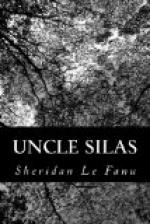Of my wretched uncle’s religion what am I to say? Was it utter hypocrisy, or had it at any time a vein of sincerity in it? I cannot say. I don’t believe that he had any heart left for religion, which is the highest form of affection, to take hold of. Perhaps he was a sceptic with misgivings about the future, but past the time for finding anything reliable in it. The devil approached the citadel of his heart by stealth, with many zigzags and parallels. The idea of marrying me to his son by fair means, then by foul, and, when that wicked chance was gone, then the design of seizing all by murder, supervened. I dare say that Uncle Silas thought for a while that he was a righteous man. He wished to have heaven and to escape hell, if there were such places. But there were other things whose existence was not speculative, of which some he coveted, and some he dreaded more, and temptation came. ’Now if any man build upon this foundation, gold, silver, precious stones, wood, hay, stubble, every man’s work shall be made manifest; for the day shall declare it, because it shall be revealed by fire; and the fire shall try every man’s work of what sort it is.’ There comes with old age a time when the heart is no longer fusible or malleable, and must retain the form in which it has cooled down. ’He that is unjust, let him be unjust still; he which is filthy, let him be filthy still.’
Dudley had disappeared; but in one of her letters, Meg, writing from her Australian farm, says: ’There’s a fella in toon as calls hisself Colbroke, wi’ a good hoose o’ wood, 15 foot length, and as by ‘bout as silling o’ the pearler o’ Bartram—only lots o’ rats, they do say, my lady—a bying and sellin’ of goold back and forred wi’ the diggin foke and the marchants. His chick and mouth be wry wi’ scar o’ burns or vitterel, an’ no wiskers, bless you; but my Tom ee toll him he knowed him for Master Doodley. I ant seed him; but he sade ad shute Tom soon is look at ‘im, an’ denide it, wi’ mouthful o’ curses and oaf. Tom baint right shure; if I seed un wons i’d no for sartin; but ‘appen,’twil best be let be.’ This was all.
Old Hawkes stood his ground, relying on the profound cunning with which their actual proceedings had been concealed, even from the suspicions of the two inmates of the house, and on the mystery that habitually shrouded Bartram-Haugh and all its belongings from the eyes of the outer world.
Strangely enough, he fancied that I had made my escape long before the room was entered; and, even if he were arrested, there was no evidence, he was certain, to connect him with the murder, all knowledge of which he would stoutly deny.
There was an inquest on the body of my uncle, and Dr. Jolks was the chief witness. They found that his death was caused by ’an excessive dose of laudanum, accidentally administered by himself.’
It was not until nearly a year after the dreadful occurrences at Bartram that Dickon Hawkes was arrested on a very awful charge, and placed in gaol. It was an old crime, committed in Lancashire, that had found him out. After his conviction, as a last chance, he tried a disclosure of all the circumstances of the unsuspected death of the Frenchwoman. Her body was discovered buried where he indicated, in the inner court of Bartram-Haugh, and, after due legal enquiry, was interred in the churchyard of Feltram.




